This is an old revision of this page, as edited by Hack-Man (talk | contribs) at 19:49, 17 January 2014 (reverting (undo didn't work)). The present address (URL) is a permanent link to this revision, which may differ significantly from the current revision.
Revision as of 19:49, 17 January 2014 by Hack-Man (talk | contribs) (reverting (undo didn't work))(diff) ← Previous revision | Latest revision (diff) | Newer revision → (diff)
| Steve Wozniak | |
|---|---|
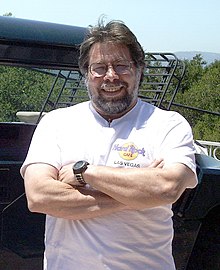 Wozniak on June 10, 2005 Wozniak on June 10, 2005 | |
| Born | Stephen Gary Wozniak (1950-08-11) August 11, 1950 (age 74) San Jose, California, U.S. |
| Nationality | American |
| Other names | Stephen Wozniak Woz |
| Alma mater | University of California, Berkeley |
| Occupation(s) | Computer scientist Electronics engineer |
| Spouse(s) |
Alice Robertson
(m. 1976–1980) Candice Clark (m. 1981–1987) Suzanne Mulkern (m. 1990–2004) Janet Hill (m. 2008) |
| Children | 3 |
| Call sign | ex-WA6BND (ex-WV6VLY) |
| Website | www |
Stephen Gary "Steve" Wozniak (born August 11, 1950), known as "Woz", is an American inventor, computer engineer and programmer who co-founded Apple Computer (now Apple Inc.) with Steve Jobs and Ronald Wayne. Wozniak single-handedly invented both the Apple I and Apple II computers in the late 1970s. These computers contributed significantly to the microcomputer revolution.
Names
The name on Wozniak's birth certificate is "Stephan Gary Wozniak", but Steve's mother said that she intended it to be spelled "Stephen", and "Stephen" is what he uses.
Wozniak has been referred to frequently by the nickname "Woz", "The Wonderful Wizard of Woz", or "The Woz".; "WoZ" (short for "Wheels of Zeus") is also the name of a company Wozniak founded. In the early 1970s Wozniak was also known as "Berkeley Blue" in the phone phreak community.
Early life and career
Wozniak was born in San Jose, California, the son of Margaret Elaine (Kern) and Jacob Francis "Jerry" Wozniak. He is of Polish and German ancestry on his father's side, and of German, Irish, and English descent on his mother's.
In a 2007 interview with ABC News, Wozniak recounted how and when he first met Steve Jobs: "We first met in 1971 during my college years, while he was in high school. A friend said, 'you should meet Steve Jobs, because he likes electronics and he also plays pranks.' So he introduced us."
Eventually Jobs was assigned to create a circuit board for the arcade video game Breakout. According to Atari co-founder Nolan Bushnell, Atari offered $100 for each chip that was eliminated in the machine. Jobs had little specialized knowledge of circuit board design and made a deal with Wozniak to split the fee evenly between them if Wozniak could minimize the number of chips. Wozniak reduced the number of chips by 50 by using RAM for the brick representation. Too complex to test at the time, the fact that this prototype also had no scoring or coin mechanisms meant Woz's prototype could not be used. Jobs was paid regardless.
Jobs told him that Atari gave them only $700 (instead of the offered $5,000), and that Wozniak's share was thus $350. Wozniak did not learn about the actual bonus until ten years later, but said that if Jobs had told him about it and had said he needed the money, Wozniak would have given it to him.
Apple Computer
Origins of Apple
In 1971 Steve Wozniak's friend Bill Fernandez introduced Steve Jobs to him. At the time Fernandez and Jobs were attending Homestead High School. Jobs and Wozniak became friends when Jobs worked for the summer at Hewlett-Packard (HP), where Wozniak too was employed, working on a mainframe computer. Also in 1971 Wozniak withdrew from the University of California, Berkeley, only one year after enrolling.
In 1976, Wozniak developed the computer that eventually made him famous. By himself he designed the hardware, circuit board designs, and operating system for the Apple I. June 29, 1975 Wozniak tested his first working prototype, displaying a few letters and running sample programs. It was the first time in history that a character displayed on a TV screen was generated by a home computer. With the Apple I design, he and Jobs were largely working to impress other members of the Palo Alto-based Homebrew Computer Club, a local group of electronics hobbyists interested in computing. The Club was one of several key centers which established the home hobbyist era, essentially creating the microcomputer industry over the next few decades. Unlike other Homebrew designs, the Apple had an easy-to-achieve video capability that drew a crowd when it was unveiled.
Jobs had the idea to sell the Apple I as a fully assembled printed circuit board. Wozniak, at first skeptical, was later convinced by Jobs that even if they were not successful they could at least say to their grandkids they had had their own company. Together they sold some of their possessions (such as Wozniak's HP scientific calculator and Jobs' Volkswagen van), raised USD $1,300, and assembled the first boards in Jobs' bedroom and later (when there was no space left) in Jobs' garage. Wozniak's apartment in San Jose was filled with monitors, electronic devices, and some computer games Wozniak had developed.
On April 1, 1976, Jobs and Wozniak formed Apple Computer. Wozniak resigned from his job at Hewlett-Packard and became the vice president in charge of research and development at Apple. Wozniak's Apple I was similar to the Altair 8800, the first commercially available microcomputer, except the Apple I had no provision for internal expansion cards. With expansion cards the Altair could attach to a computer terminal and be programmed in BASIC. In contrast, the Apple I was a hobbyist machine. Wozniak's design included a $25 microprocessor (MOS 6502) on a single circuit board with 256 bytes of ROM, 4K or 8K bytes of RAM, and a 40-character by 24-row display controller. Apple's first computer lacked a case, power supply, keyboard, and display, components the user had to provide.
The Apple I sold for $666.66. (Wozniak later said he had no idea about the relation between the number and the mark of the beast, and "I came up with because I like repeating digits.") Jobs and Wozniak sold their first 50 system boards to Paul Terrell, who was starting a new computer shop, called the Byte Shop, in Mountain View, California.
After the success of the Apple I, Wozniak designed the Apple II, the first personal computer that had the ability to display color graphics, and BASIC programming language built-in. During the design stage, Steve Jobs argued that the Apple II should have two expansion slots, while Wozniak wanted six. After a heated argument, during which Wozniak had threatened for Jobs to 'go get himself another computer', they decided to go with eight slots. The Apple II became one of the first highly successful mass-produced personal computers.
Employment with Apple

Wozniak enjoyed engineering, not management, and as other engineers joined the growing company he no longer felt needed at Apple. He did not immediately return after recovering from an airplane crash in February 1981, seeing it as a good reason to leave. In May 1982 and 1983, Wozniak sponsored two US Festivals to celebrate evolving technologies; they ended up as a technology exposition and a rock festival as a combination of music, computers, television and people. In 1983 he returned to Apple product development, desiring no more of a role than that of an engineer and a motivational factor for the Apple workforce.
He married Candice Clark and returned to Berkeley under the name "Rocky Clark" (Rocky Raccoon was his dog's name and Clark his wife's maiden name), earning his undergraduate degree in Electrical Engineering and Computer Sciences (EECS) in 1986.
Wozniak permanently ended his full-time employment with Apple on February 6, 1987, 12 years after having created the company. Wozniak remains an employee of Apple and receives a stipend, estimated to be USD$120,000 per year. He is also an Apple shareholder. He also maintained connections with Steve Jobs until Jobs' death in October 2011, although, in 2006, Wozniak stated that he and Jobs were not close friends.
Even with the success he helped create at Apple, Wozniak felt that Apple was a hindrance to become who he wanted to be and that it was "the bane of his existence" (Flatow, 263). One thing he wanted to do was teach elementary school because of the important role teachers play in students' lives. Eventually, he did teach computer classes to children from the fifth through ninth grades and teachers as well.
In a 2013 interview, Steve Wozniak said that the Macintosh "failed" under Steve Jobs, and that it wasn't until Jobs left that it became a success. Jobs called the Lisa group, the team that had kicked Jobs out, idiots for making the Lisa computer too expensive. To compete with the Lisa, Jobs and his new team produced a cheaper computer, one that, according to Wozniak, was "weak", "lousy" and "still at a fairly high price". "He made it by cutting the RAM down, by forcing you to swap disks here and there", says Wozniak. He attributed the eventual success of the Macintosh to people like John Sculley "who worked to build a Macintosh market when the Apple II went away".
Post-Apple career
Wozniak founded a new venture called CL 9, which developed and brought the first programmable universal remote control to market in 1987. Wozniak also taught fifth-grade students.
In 2001, Wozniak founded Wheels of Zeus (WOZ), to create wireless GPS technology to "help everyday people find everyday things much more easily." In 2002, he joined the Board of Directors of Ripcord Networks, Inc., joining Ellen Hancock, Gil Amelio, Mike Connor, and Wheels of Zeus co-founder Alex Fielding, all Apple alumni, in a new telecommunications venture. Later the same year he joined the Board of Directors of Danger, Inc., the maker of the Hip Top (a.k.a. Side Kick from T-Mobile).
In 2006, Wheels of Zeus was closed, and Wozniak founded Acquicor Technology, a holding company for acquiring technology companies and developing them, with Apple alumni Ellen Hancock and Gil Amelio.
In September 2006, Wozniak published his autobiography, iWoz: From Computer Geek to Cult Icon: How I Invented the Personal Computer, Co-Founded Apple, and Had Fun Doing It. It was co-authored by writer Gina Smith.
In March 2006, Wozniak attended the FIRST National Competition in Atlanta to show off Lego robots. In 2010, he attended another FIRST event, a regional event in downtown Phoenix Arizona at the Arizona State Fairgrounds. In 2012, he attended and was a judge at another FIRST event, the FRC Las Vegas Regional.
In September 2007, Wozniak joined Scottevest as an Advisory Board Member.
In February 2009, Steve Wozniak joined Fusion-io, a data storage and server company, in Salt Lake City, Utah as their chief scientist.
On November 18, 2010, Steve Wozniak gave a speech at the Science & Technology Summit at the World Forum Convention Center in The Hague in which he predicted that Android would be dominant over the iPhone market-wise but the iPhone would retain the quality edge.
On June 9, 2011, Wozniak joined members of Fusion-io’s management team to celebrate the company’s first day of trading on the NYSE by ringing The Opening Bell.
On October 20, 2011, Wozniak delivered a keynote presentation entitled "Today’s Science Fiction, Tomorrow’s Science Fact" at IP EXPO, a Computer expo which took place at Earls Court Exhibition Centre in London.
On November 14, 2011, Steve Wozniak was the keynote speaker at "Rutgers Entrepreneurship Day" at Rutgers University in New Brunswick, New Jersey.
On May 16, 2012, Steve Wozniak talked at the "WOZ Live" event at the Melbourne Exhibition and Convention Centre, Australia.
On October 20, 2012, Steve Wozniak talked at the "Tijuana Innovadora 2012" event at the Tijuana Cultural Center, in Tijuana, Mexico.
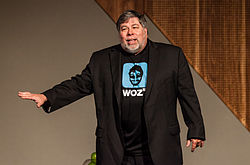
Philanthropy
Since leaving Apple, Wozniak has provided all the money, as well as a good amount of on-site technical support, for the technology program in his local school district. Un.U.Son. (Unite Us In Song), an organization Wozniak formed to organize the two US Festivals, is now primarily tasked with supporting his educational and philanthropic projects. In 1986, Wozniak lent his name to the Stephen G. Wozniak Achievement Awards (popularly known as Wozzie Awards), which he presented to six Bay Area high school and college students for their innovative use of computers in the fields of business, art and music.
Honors and awards
In 1979, Wozniak was awarded the ACM Grace Murray Hopper Award. In 1985, Wozniak received the National Medal of Technology (with Steve Jobs) from US President Ronald Reagan. In December 1989, he received an honorary Doctor of Engineering degree from the University of Colorado at Boulder, where he studied in the late sixties. Later he donated funds to create the "Woz Lab" at the University of Colorado at Boulder. In 1997, he was named a Fellow of the Computer History Museum. Wozniak was a key contributor and benefactor to the Children's Discovery Museum of San Jose; the street in front of the museum has been renamed Woz Way in his honor.
In September 2000, Wozniak was inducted into the National Inventors Hall of Fame, and in 2001 he was awarded the 7th Annual Heinz Award for Technology, the Economy and Employment. The American Humanist Association awarded him the Isaac Asimov Science Award in 2011.
In December 2005, Wozniak was awarded an honorary Doctor of Engineering degree from Kettering University. He also received honorary degrees from North Carolina State University and Nova Southeastern University, and the Telluride Tech Festival Award of Technology. In May 2011, Wozniak received an honorary Doctor of Engineering degree from Michigan State University. In June 2012, Wozniak was awarded an honorary Doctor of Engineering degree from Santa Clara University.
He was awarded the Global Award of the President of Armenia for Outstanding Contribution to Humanity Through IT in 2011.
Honorary degrees
For his contributions to technology, Wozniak has been awarded a number of Honorary Doctor of Engineering degrees which include the following:
- University of Colorado at Boulder: 1989
- North Carolina State University: 2004
- Kettering University: 2005
- Nova Southeastern University: 2005
- ESPOL University in Ecuador: 2008
- Michigan State University: 2011
- Concordia University in Montreal Canada: June 22, 2011
- State Engineering University of Armenia: November 11, 2011
- Santa Clara University: June 16, 2012
- University Camilo Jose Cela in Madrid, Spain: November 8, 2012
- Universidad Nacional de Ingenieria in Lima, Peru: November 22, 2012
Patents
Wozniak is listed as the sole inventor on the following patents:
- US Patent No. 4,136,359: "Microcomputer for use with video display"—for which he was inducted into the National Inventors Hall of Fame.
- US Patent No. 4,210,959: "Controller for magnetic disc, recorder, or the like"
- US Patent No. 4,217,604: "Apparatus for digitally controlling PAL color display"
- US Patent No. 4,278,972: "Digitally-controlled color signal generation means for use with display"
Film
- Jobs, a 2013 film about the life of Steve Jobs. Wozniak is portrayed by Josh Gad.
- Mobilize: A Film About Cell Phone Radiation a 2013 documentary features Wozniak.
- The Secret History of Hacking, a 2001 documentary film featuring Wozniak.
- Pirates of Silicon Valley – a 1999 TNT film which chronicles the rise of Apple and Microsoft from 1971 to 1997. Wozniak is portrayed by Joey Slotnick.
- Triumph of the Nerds, a 1996 PBS documentary series about the rise of the personal computer.
Television
After seeing her stand-up performance in Saratoga, California, Wozniak began dating comedian Kathy Griffin. Together, they attended the 2007 Emmy Awards, and he subsequently made many appearances on the fourth season of her show Kathy Griffin: My Life on the D-List. Woz is on the show as her date for the Producers Guild of America award show. However, on a June 19, 2008 appearance on The Howard Stern Show, Griffin confirmed that they were no longer dating and decided to remain friends.
Wozniak portrays a parody of himself in the first episode of the television series Code Monkeys; he plays the owner of Gameavision before selling it to help fund Apple. He later appears again in the twelfth episode when he is in Las Vegas at the annual Video Game Convention and sees Dave and Jerry. He also appears in a parody of the "Get a Mac" ads featured in the final episode of Code Monkeys' second season. Wozniak is also interviewed and featured in the documentary Hackers Wanted and on BBC.
Wozniak competed on Season 8 of Dancing with the Stars in 2009 where he danced with Karina Smirnoff. Despite Wozniak and Smirnoff receiving 10 combined points from the three judges out of 30, the lowest score of the evening, he remained in the competition. He later posted on a social networking site that he felt that the vote count was not legitimate and suggested that the Dancing with the Stars judges had lied about the vote count to keep him on the show. After being briefed on the method of judging and vote counting, he retracted and apologized for his statements. Despite suffering a pulled hamstring and a fracture in his foot, Wozniak continued to compete, but was eliminated from the competition on March 31, with a score of 12 out of 30 for an Argentine Tango.
On September 30, 2010, he appeared as himself on The Big Bang Theory season 4 episode "The Cruciferous Vegetable Amplification". While dining in The Cheesecake Factory where Penny works, he is approached by a robot Sheldon. Leonard tries to explain to Penny who Wozniak is, but she says she already knows him from Dancing with the Stars.
On September 30, 2013, he appeared along with Apple alum Daniel Kottke and Andy Hertzfeld on the television show John Wants Answers to discuss the movie Jobs.
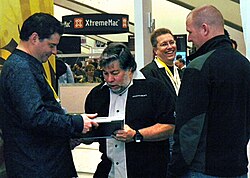
Personal life
Wozniak lives in Los Gatos, California.
He is a Freemason, despite not believing in a supreme being (which is required by Masonic rules). Wozniak describes his impetus for joining the Freemasons as being able to spend more time with his wife at the time, Alice. Alice belonged to the Order of the Eastern Star, associated with the Masons. Wozniak has said that he quickly rose to a third degree Freemason because, whatever he does, he tries to do well. He was initiated in 1979 at Charity Lodge No. 362 in Campbell, California, now part of Mt. Moriah Lodge No. 292 in Los Gatos, California.
Wozniak is married to Janet Hill. He has three children from a previous marriage.
On his religious views, Wozniak called himself an "atheist or agnostic".
He is a member of a Segway Polo team, the Silicon Valley Aftershocks.
His favorite video game is Tetris. In the 1990s he submitted so many high scores for the game to Nintendo Power that they would no longer print his scores, so he started sending them in under the alphabetically reversed "Evets Kainzow".
Airplane crash
On February 7, 1981, the Beechcraft Bonanza A36TC Wozniak was piloting crashed soon after takeoff from the Sky Park Airport in Scotts Valley, California. The plane stalled while climbing, then bounced down the runway, went through two fences, and crashed into an embankment. Wozniak and his three passengers, then-fiance Candice Clark, her brother and his girlfriend, were injured. Wozniak sustained severe face and head injuries, including losing a tooth, and also suffered for five weeks after the crash from anterograde amnesia, the inability to create new memories. He had no memory of the crash, and did not remember his name in the hospital or the things he did after he was released from the hospital. The National Transportation Safety Board investigation report cited premature liftoff and pilot inexperience as probable causes of the crash.
See also
References
- ^ Wozniak, S. G.; Smith, G. (2006), iWoz: From Computer Geek to Cult Icon: How I Invented the Personal Computer, Co-Founded Apple, and Had Fun Doing It. W. W. Norton & Company
- http://www.nndb.com/people/519/000023450/#FN1
- "Stephen Wozniak". biography. biography.com. Retrieved April 6, 2012.
- "Nolan Bushnell Appointed to Atari Board — AtariAge Forums — Page 30". Atariage.com. April 29, 2010. Retrieved November 11, 2010.
- Sean Mulligan. "STEVE "THE WOZ" WOZNIAK: 2011 ISAAC ASIMOV SCIENCE AWARD". American Humanist Association. Retrieved May 13, 2012.
- Lapsley, Phil (February 16, 2013). "From "phreaks" to Apple: Steve Jobs and Steve Wozniak's "eureka!" moment". Salon.com. Retrieved March 22, 2013.
- RootsWeb's WorldConnect Project: Dowling Family Genealogy. Wc.rootsweb.ancestry.com (December 28, 1925). Retrieved on August 24, 2013.
- "Letters-General Questions Answered". Woz.org. March 1, 2000. Retrieved February 6, 2012.
- "Three Minutes With Steve Wozniak". ABCNews.go.com. July 20, 2007. Retrieved November 10, 2013.
- Letters – General Questions Answered (Wayback machine copy from June 2011, as later versions of the page have had this fact removed), Woz.org
Wozniak, Steven: "iWoz", a: pp. 147–48, b: p. 180. W. W. Norton, 2006. ISBN 978-0-393-06143-7
Kent, Stevn: "The Ultimate History of Video Games", pp. 71–3. Three Rivers, 2001. ISBN 0-7615-3643-4
"Breakout". Arcade History. June 25, 2002. Retrieved April 19, 2010.
"Classic Gaming: A Complete History of Breakout". GameSpy. Archived from the original on July 8, 2012. Retrieved April 19, 2010. - Walter Isaacson: Steve Jobs, Chapter Four – "Atari and India" pp. 104–107. Simon & Schuster (October 24, 2011) ISBN 1-4516-4855-3
- Young, Jeffrey S. (December 1988). Steve Jobs: The Journey is the Reward. Lynx Books. ISBN 1-55802-378-X.
- ^ Freiberger, Paul; Swaine, Michael (2000). Fire in the Valley. McGraw-Hill. ISBN 0-07-135892-7.
- ^ Williams, Gregg; Moore, Rob (January 1985). "The Apple Story / Part 2: More History and the Apple III". BYTE (interview). p. 166. Retrieved October 26, 2013.
{{cite news}}: CS1 maint: multiple names: authors list (link) - Harriet Stix (May 14, 1986). "A UC Berkeley Degree Is Now the Apple of Steve Wozniak's Eye". Los Angeles Times.
Rocky Clark is Apple computer creator Steve Wozniak. He used an alias at UC Berkeley because, he said, 'I knew I wouldn't have time enough to be an A+ student.' Rocky was the first name of his dog Rocky Raccoon, and Clark his wife Candice's last name.
- "CNN.com Video". CNN.
- Letters-General Questions Answered, Woz.org
- Apple's Other Steve (Stock Research) March 2, 2000, Fool.com
- Krishnamoorthy, Anand; Li, Susan. "Jobs's Death Was Like Lennon, JFK Getting Shot, Wozniak Says". Bloomberg Businessweek. Retrieved October 7, 2011.
- Peterson, Kim (April 16, 2006). "Steve Wozniak Q & A". Seattletimes.nwsource.com. Retrieved March 22, 2013.
- Flatow, Ira. Present at the Future: From Evolution to Nanotechnology, Candid and Controversial Conversations on Science and Nature. USA: HarperCollins, 2007. 263-4. Print.
- "Steve Wozniak on Newton, Tesla, and why the original Macintosh was a 'lousy' product". Archived from the original on June 28, 2013. Retrieved June 28, 2013.
- Weisman, Robert (March 25, 2006). A star who aims to spark innovation by students., The Boston Globe.
- "Scottevest Board of Advisors
- Wozniak Accepts Post at a Storage Start-Up New York Times February 4, 2009.
- iPhone vs. Android: Steve Wozniak Says Android Will Be Dominant One Day, Nexus404.com, November 18, 2010.
- Fusion-io Celebrates Initial Public Offering and First Day of Trading on the New York Stock Exchange NYSE Euronext New York, June 9, 2011.
- Steve Wozniak’s lessons for innovators IPEXPO ONLINE Fri, October 21, 2011.
- Rutgers Professional Science Masters Webpage, April 15, 2012.
- Enterprise Melbourne Webpage.
- "Conference Speakers: Stephen Gary Wozniak". Tijuana Innovadora. Retrieved June 1, 2013.
- Seibold, Chris. "This Day in Apple History December 28, 1989: Woz Gets Honorary Doctorate, Dish Incident Forgotten". Retrieved July 31, 2007.
- "maps.google.com". maps.google.com. January 1, 1970. Retrieved November 11, 2010.
- Inventor Profile — National Inventors Hall of Fame.
- "The Heinz Awards, Steve Wozniak profile". Heinzawards.net. Retrieved November 11, 2010.
- Honorary Doctorate — Kettering University List of Honorary Degrees.
- ^ Honorary Doctorate — North Carolina State University List of Honorary Degrees.
- "Commencement | MSU Commencement". Commencement.msu.edu. Retrieved March 22, 2013.
- "Global Award of the President of Armenia for Outstanding Contribution to Humanity Through IT". Globalitaward.am. Retrieved March 22, 2013.
- US Patent No. 4,136,359, US Patent & Trademark Office, Patent Full Text and Image Database.
- Controller for magnetic disc, recorder, or the like US Patent 4210959.
- Apparatus for digitally controlling PAL color display US Patent 4217604.
- Digitally-controlled color signal generation means for use with display US Patent 4278972.
- Collins, Michelle. "VH1 Best Week Ever — Off The Market: Kathy Griffin Finds a New Man!". Archived from the original on August 20, 2007. Retrieved September 18, 2007.
- "Apple Co-Founder Steve Wozniak Escorted Comedian Kathy Griffin & Her Potty Mouth To The Emmy's". Retrieved September 18, 2007.(Wayback Archive)
- Who’s so vain? June 19, 2008 — The Howard Stern Show.
- "Apple co-founder Steve Wozniak to compete on 'Dancing With the Stars'" from Los Angeles Times. Retrieved on February 8, 2009.
- "Why Apple founders got 'fired up.'". BBC News. November 21, 2008. Retrieved February 5, 2009.
- Matyszczyk, Chris (March 17, 2009). "Woz in ABC 'outright lie' accusation". CNET.
- Fashingbauer Cooper, Gael (March 19, 2009). "Wozniak sorry he called 'Dancing' show 'fake'". MSNBC.
- Injured Woz Will Perform People.com, March 23, 2009.
- Woz Gets Hipchecked Off the Dance Floor, by Kara Swisher, April 1, 2009, All Things Digital.
- "A Few Famous Masons". Grand Lodge of British Columbia and Yukon. Retrieved March 25, 2013.
- "'I'm in trouble' says Woz's wife" from Apple 2.0" on CNNMoney
- Steve Wozniak (2002). "Letters-General Questions Answered". Los Gatos, California: Unuson Corp. Retrieved June 20, 2013.
I am also atheist or agnostic (I don't even know the difference). I've never been to church and prefer to think for myself. I do believe that religions stand for good things, and that if you make irrational sacrifices for a religion, then everyone can tell that your religion is important to you and can trust that your most important inner faiths are strong.
- "Woz and I agree: 'Tetris' for the Gameboy is the best game ever, by Daniel Terdiman, December 11, 2007, Geek Gestalt on CNET News.
- "Evets Kainzow", by Steve Wozniak, Undated, Woz.org
- Tirrell, Rick (2009). The wisdom of resilience builders : how our best leaders create the world's most enduring enterprises. Bloomington, IN: AuthorHouse. p. 236. ISBN 1449053238.
- O'Grady, Jason D. (2009). Apple Inc. Westport, Conn.: Greenwood Press. p. 27. ISBN 0313362440.
- Linzmayer, Owen W. (2004). Apple confidential 2.0 : the definitive history of the world's most colorful company (. ed.). San Francisco, Calif.: No Starch Press. pp. 28–30. ISBN 1593270100.
External links
| This article's use of external links may not follow Misplaced Pages's policies or guidelines. Please improve this article by removing excessive or inappropriate external links, and converting useful links where appropriate into footnote references. (October 2011) (Learn how and when to remove this message) |
- woz.org Wozniak's official site
- "Apple Computer The Early Days A Personal Perspective" by Paul Laughton
- Interview with Steve Wozniak by Jessica Livingston
- Apple-1 Computer blog by John Calande
Videos
- In Search of the Valley A 2006 documentary on Silicon Valley featuring Steve Wozniak
- iWoz: From Computer Geek to Culture Icon: How I Invented the Personal Computer, Co-Founded Apple, and Had Fun Doing It
- Steve Wozniak’s talk on his iWoz book at MIT in 2006
- Steve Wozniak’s talk on his iWoz book at Google in 2006
- Steve Wozniak’s talk on his iWoz book at Oxford in 2008 (audio recording)
- Steve Wozniak interview on iWoz Book An hour long video interview by Guy Kawasaki, November, 2006
- Steve Wozniak interviewed by Charlie Rose January 29, 2007
- Woz on Innovation and Motivation April 10, 2013
| Steve Wozniak | ||
|---|---|---|
| Products and projects | 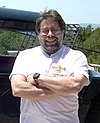 | |
| Companies |
| |
| Awards | ||
| Films |
| |
| TV appearances |
| |
| Related | ||
| Key figures in the history of Apple Inc. | |
|---|---|
| Founders | |
| CEOs |
|
| Current employees | |
| Former employees |
|
| Grace Murray Hopper Award recipients | |
|---|---|
|
| Hewlett-Packard | |||||||||||||||
|---|---|---|---|---|---|---|---|---|---|---|---|---|---|---|---|
| Founders | 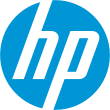 | ||||||||||||||
| Directors |
| ||||||||||||||
| Executive officers |
| ||||||||||||||
| Computer hardware products |
| ||||||||||||||
| Consumer electronics and accessories |
| ||||||||||||||
| Other divisions | |||||||||||||||
| Software | |||||||||||||||
| Discontinued products |
| ||||||||||||||
| Closed divisions | |||||||||||||||
| HP CEOs | |||||||||||||||
| Assets | |||||||||||||||
| See also | |||||||||||||||
- Misplaced Pages external links cleanup from October 2011
- 1950 births
- Living people
- Amateur radio people
- American atheists
- American agnostics
- American computer businesspeople
- American computer programmers
- American computer scientists
- American engineers
- American inventors
- American people of Polish descent
- Apple II family
- Apple Inc. executives
- Computer designers
- Grace Murray Hopper Award laureates
- Hewlett-Packard people
- National Medal of Technology recipients
- Dancing with the Stars (U.S. TV series) participants
- Businesspeople from San Jose, California
- University of California, Berkeley alumni
- University of Colorado alumni
- People from Sunnyvale, California
- Members of the United States National Academy of Engineering
- People with brain injuries
- Magnates, moguls, and tycoons of the world